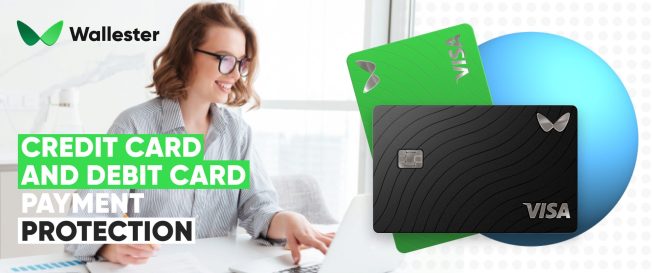Whether shopping online or paying at a contactless terminal, credit and debit cards are some of the most secure ways to make a purchase. Multiple consumer protections are available to anyone with an eligible account depending on your card. In this article, we help you determine what protections you get when spending on your card under the chargeback scheme and section 75.
Chargeback and Section 75
Chargeback and Section 75 are the two main avenues you can use if you paid by card and are entitled to a refund. Both routes offer an array of protection for various purchases. Although chargeback generally offers lesser protection, it can cover you in areas where Section 75 cannot.
What is a Chargeback?
A chargeback refers to an action taken by a card issuer to reverse card payments and initiate a dispute resolution process. It is a protection scheme that Mastercard, Visa, and American Express have enlisted to enable you to claim a refund from your card provider in case your purchase is faulty or doesn’t arrive. The chargeback scheme covers debit, prepaid, and credit card payments of all amounts. Unlike Section 75, it is not a legal protection. Usually, chargebacks occur between the trader and a credit card issuing bank or consumer. If you wish to dispute a credit or debit card transaction, you must inform your card issuer to make a chargeback claim.
When would I use a Chargeback?
As a consumer, you have the right to accurate billing and protection from unauthorised charges. Importantly, you have the right to dispute charges for goods or services not delivered or those that are different than described. You may also enjoy additional rights from your bank, credit card issuer, or card association. You can use a chargeback for payments made through your debit, prepaid or credit cards. Generally, chargebacks cover the following situations:
- Goods or services not as described.
- Goods or services not delivered.
- Billing errors
- A subscription that was not stopped even after being cancelled.
- Fraudulent transaction.
- Return credit not processed.
Chargeback abilities do not offer protection against loss, damage, or theft of a purchased product after it has been successfully delivered. However, several credit companies provide additional protections and benefits such as loss, damage, theft, or return protections. Some credit cards also offer extended warranty protection.
How Does Chargeback Work?
Once you submit a chargeback request, your credit card issuer will provide written confirmation of this request. After collecting your reason for disputing a charge and the supporting documentation, they will submit the claim to the merchant. Generally, the merchant and their bank have approximately ten days to respond to this inquiry.
If the merchant accepts the chargeback, your bank will close the billing dispute and credit your account with the disputed amount. On the other hand, if the merchant denies the chargeback claim and includes documentation, your bank will evaluate the information provided and determine whether to issue you a credit. The bank will then write to you informing you of their decision, along with an account credit if your dispute is successful.
If the bank evaluates the merchant’s evidence and dismisses your dispute, you can submit a subsequent chargeback claim if you disagree with the decision. In this case, you have to follow your bank’s dispute resolution process, which often involves arbitration.
How Long Do I Have to Make a Chargeback Claim?
Typically, chargebacks are limited to up to 120 days from the date of purchase. You should only start a claim if you have already tried and failed to get a refund directly from the merchant. In this case, you should submit the chargeback claim as soon as possible. If the retailer goes out of business, your claim will still be addressed, but there is no guarantee that you will be refunded.
What do I Need to Give to My Card Provider?
When submitting a chargeback claim, the more evidence you can provide, the stronger your claim becomes. Typically, you should give proof through receipts, correspondence, and invoices. In addition, you should provide the seller’s name, details, and the date of purchase, along with supporting information for a reason for the dispute. If the goods purchased were faulty, you should provide proof that you returned them to the merchant. Sometimes, your card issuer may require additional information, including invoices, receipts, and written correspondence between you and the retailer, to proceed with the chargeback process.
If your debit or credit card has been fraudulently charged, you are protected by Visa’s zero liability policy and are guaranteed a refund. Importantly, you must report all cases of suspected fraud as soon as possible to allow your credit card issuer to block your card and secure your account.
Section 75: Credit Card Payment Protection
Section 75 is part of the Consumer Credit Act of 1974, which states that credit card providers are jointly and severally responsible for any breach of contract or misrepresentation by a merchant or retailer. It allows you to request a refund from your credit card issuer if the merchant does not honour their agreement correctly.
What does Section 75 Cover?
Most credit card agreements, including store cards and car finance agreements, are covered under Section 75. Under this protection, credit card transactions of over £100 but not more than £30,000 can be disputed. It covers a wide range of instances, including:
- Orders that are not delivered or are not as described.
- Foreign transactions and goods purchased online by telephone or mail.
- Faulty orders.
- The merchant goes bust. For example, your holiday costs can be refunded if the holiday company you used goes bust.
What does Section 75 not Cover?
Instances not covered by Section 75 include:
- Debit and prepaid card payments and purchases (chargeback claims apply in this case).
- Withdrawing cash from credit cards and using it to pay for goods and services.
- Faulty items that are still under warranty with the manufacturer.
- Credit card payments are made through an agent or third party. For example, Section 75 applies when you buy concert tickets directly from the venue, but it may not use if you buy them through a ticket agency.
- Land purchases
- Cases where the credit card provider also doubles as the supplier.
- Hire purchase agreements.
If you are not covered by Section 75, you may still have some protections under the chargeback scheme.
What Spending Limits are there to Section 75?
Section 75 protections apply to credit card payments between £100 and £30,000. The £100 minimum applies to each item or set of items bought but not the total bill. For instance, if you purchased two things whose invoice totals £100, you may not be eligible for Section 75 Protections if the price of each product is less than the minimum threshold. In this case, you might be able to request your money back under the chargeback scheme. Additionally, you will not be covered if additional fees, including delivery and process charges, take the cost over £100. For example, if your product costs £90, but the website fees and delivery made the total cost £110, you do not have Section 75 protections as the item’s original price is less than £100.
If you are making a deposit for an event or hotel, you do not need to spend £100 to get Section 75 protections. For instance, if you put down a £50 deposit for an event that cost £150, you could still claim the complete £150 if the event was cancelled. In this case, a warranty is enough to get you legal protection.
Similarly, if you have booked flights or a holiday costing £100 but not more than £30,000, you can claim a refund under Section 75 of the companies go bust, even if you just made a deposit. However, some situations, such as purchasing your flight ticket from a third party, do not apply. In addition, costs that you did not have to incur are not covered under these protections. These include additional costs associated with extending your holiday longer than needed after the airline went bust.
Are Cash Withdrawals Covered by Section 75?
Cash withdrawals using your credit card are not covered by Section 75. If you withdraw cash from your credit card and buy something, you are not eligible for Section 75 protections, as there is no direct link between your credit card company and the merchant. Cash withdrawals are typically avoided as they attract a certain fee and substantial interest rate.
How can you Claim Money Back if you have spent less than €100 or spent money on a debit card?
For debit and credit card payments below £100, you can request a refund under the chargeback scheme in case of a dispute. Generally, this scheme covers purchases of any value made using debit, prepaid, and credit cards. Although there are no minimum spending limits in this case, time limits apply when making a chargeback claim- 120 days from the day of purchase.
If the purchases are for a future event, such as a concert, the 120-day limit starts from the day the event would have occurred. Ideally, chargeback claims may take some time to process, as your credit card issuer has to get a refund from the merchant before they can credit it to your account. Although the chargeback scheme is handy for purchases below £100, it is not a legal protection and does not guarantee your money back.
Are PayPal Purchases Protected by Chargeback?
Although there are arguments that transactions involving a thirty party are not covered by Section 75, credit card payments made through PayPal directly to the seller are eligible for these protections. Credit card payments made through PayPal are typically protected by chargeback if the merchant has a “Commercial Entity Agreement” with PayPal. In this case, you can ask for your money back in case of misrepresentation or breach of contract.
In addition, PayPal has its own consumer protection scheme, referred to as PayPal Buyer Protection, which offers additional protections to the buyer. However, if you want legal protection under Section 75, you should try to ensure that you pay the retailer directly with your card.
Second Card holders and Section 75
Things can be a little complicated when disputed purchases have been made by a second cardholder. In this case, all claims must be made by the primary cardholder, who originally signed the credit agreement. If you are making a big purchase and are a second cardholder, getting the primary cardholder to purchase it is advisable to make the refund process easier in case of a dispute.
Generally, second-cardholder purchases are protected under Section 75 if they buy something within the primary holder’s agreement and if the primary cardholder will benefit from the purchased item. However, it is recommended that you check with your credit card provider to find out their rules and regulations regarding second cardholders.
Will Overseas Payments be Protected?
Section 75 refunds also apply to overseas payments and items bought online for delivery from overseas countries. The protection covers undelivered goods, goods not as described, and services such as flights or holidays if the merchant goes out of business. For overseas credit card transactions, it is recommended that you check the consumer protections of the country of purchase, as you may not be as protected as you would be for products bought within the country.
How do you Claim Money Back on Credit Cards?
Both the retailer and the credit company are responsible for Section 75 claims. If you want a refund for a credit card payment, you should first contact your credit card provider and ask for their Section 75 claim form. You should clarify that you wish to claim under the Consumer Credit Act. During this process, you must provide proof of purchase and evidence that you tried to get your money back from the seller.
Some banks let you dispute payments by simply clicking on the said transaction, while others allow you to use an online form, chat or call. Ideally, you should check with your bank or card provider to determine the steps of making a claim. This information is usually on the credit card issuer’s website or your mobile banking app’s “Help” section. If your dispute is dismissed and you still believe you are eligible for a Section 75 refund, you should escalate the case by registering a complaint to the Financial Ombudsman Service.
How long will it take to receive the money after a Claim?
The law does not mandate a time limit for the credit card company to respond to a claim. However, shares are expected to be resolved within a month or less. Consumers can submit a refund claim to the merchant or their credit card company simultaneously, but they are only entitled to receive a single payout from one of these entities.
If the process takes longer, consumers can follow up with their bank to expedite it. However, if all information, including proof of purchase, proof of trying to contact the merchant, a copy of the purchase agreement, and evidence to support the dispute, is available, refund claims can be completed within the shortest time possible.
Is there a Time Limit on Making a Section 75 Claim?
There is no time limit for making a claim under Section 75. However, there is a statute of limitations in some countries. For example, in the UK, you must make your claim within six years of purchase. This means that if you are to pursue a Section 75 claim through arbitration, this is the amount of time you have to initiate it. However, if you are making a claim for a product not delivered, you should start it on the day the product is due to arrive.
Financial Ombudsman Service
Although there is no set time frame for your credit card company to resolve a Section 75 dispute, you can complain to them if you are unhappy with how long it takes. Subsequently, they have eight weeks to address the complaint. If your credit card issuer dismisses your claim and denies you a refund, you can request a letter of deadlock so that you refer your case to the Financial Ombudsman Service (FOS). The FOS is an official body established by the UK government to settle local company and customer disputes. Their services are free of charge.
You can refer the case to FOS without the letter of deadlock if more than eight weeks have passed since you submitted your claim to your credit card company. In addition, you can approach the FOS before this period if your card provider has consented.
Forwarding your case to the Ombudsman is cheaper and safer than pursuing arbitration. Unlike courts which have to find evidence that the credit card company has broken the law, the Ombudsman operates based on the companies “treating consumers fairly.” As a result, it can rule against companies even if they have acted within the law, as it is not the only element under consideration. Often, the Ombudsman refers to trade bodies’ standards, such as the Lending Code, to ensure that the customer is treated fairly. The body’s ultimate goal is to ensure that you go back to the same position you would have been if the credit card company had acted appropriately.
How to Protect Yourself Against Scams
With the increasing use of credit cards for online payments, credit card scams can be highly damaging. These scams range from the theft of cards to phishing, counterfeiting, and more. You can protect yourself by monitoring your online credit card transactions, keeping your card information private, and immediately reporting the loss or theft of your cards. In addition, you should always review your billing statements to identify unauthorised charges and report them to your credit card provider. You should also double-check your online transactions to verify the legitimacy of the online merchants you buy from. Always ensure that the website is secure. Ultimately, exercising caution is very instrumental in avoiding credit card fraud.
We would be delighted to be your trustworthy business partner to cover your needs.
Let’s discuss your business case and how we can be beneficial to you.
Please fill out this form, and our team will contact you.


